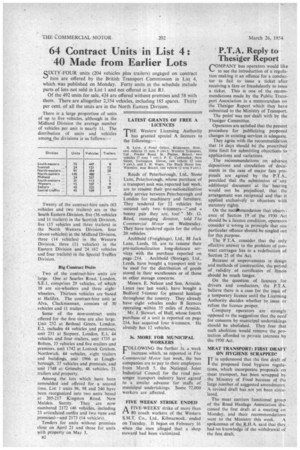' P.T.A. Reply to Thesiger Report
Page 37

If you've noticed an error in this article please click here to report it so we can fix it.
COMPANY bus operators would like to see the introduction of a regula
tion making it an offence for a conductor to fail to issue a ticket after receiving a fare or fraudulently to issue a ticket. This is one of the recommendations made by the Public Trans port Association in a memorandum on the Thesiger Report which they have submitted to the Ministry of Transport, The point was not dealt with by the Thesiger Committee.
Operators are satisfied that the present procedure for 'publicizing proposed changes in existing services is adequate.
They agree with the recommendation that 14 days should be the prescribed time limit for submitting objections to applications and variations.
The recommendations on advance depositions and circulation of docu ments in the case of major fare pro posals are agreed by the P.T.A.. provided that the submission of any additional document at the hearing Would not be prejudiced, that the arrangement was reciprocal and that it applied exclusively to objectors a ith statutory rights,
On the recoktmendation that observ
ance of Section 19 of the 1930 Act should be a licence condition, operators consider it wrong in principle that one particular offence should be singled out for this purpose.
The P.T.A. consider that the only effective answer to the problem of contract carriages lies in a redefinition of Section 25 of the Act.
Because of improvements in design and methods of Construction, the period of validity of certificates of fitness should be much longer.
On the question of licences, for drivers and conductors, the P.T.A.
believe there is a case for the issue of a temporary licence until the Licensing Authority decides whether to issue or refuse the licence proper.
Company operators are strongly opposed to the suggestion that the need' for consents by municipal undertakings should be abolished. They fear that such abolition Would remove the protection afforded to private interests by the 1930 Act.





































































































